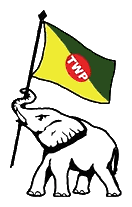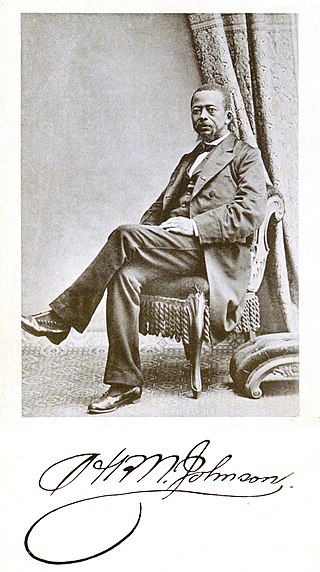
The Politics of Liberia takes place in a framework of a presidential representative democratic republic modeled on the government of the United States, whereby the president is the head of state and head of government; unlike the United States, however, Liberia is a unitary state as opposed to a federation and has a pluriform multi-party system rather than the two-party system that characterizes US politics. Executive power is exercised by the government. Legislative power is vested in both the government and the two chambers of the legislature.

The president of the Republic of Liberia is the head of state and government of Liberia. The president serves as the leader of the executive branch and as commander-in-chief of the Armed Forces of Liberia.

The True Whig Party (TWP), also known as the Liberian Whig Party (LWP), is the oldest political party in Liberia and Africa as a whole. Founded in 1869 by primarily darker-skinned Americo-Liberians in rural areas, its historic rival was the Republican Party. Following the decline of the latter, it dominated Liberian politics from 1878 until 1980. The nation was virtually governed as a one-party state under the TWP, although opposition parties were never outlawed.

General elections were held in Liberia on 19 July 1997 as part of the 1996 peace agreement ending the First Liberian Civil War. The presidency, as well as all seats in the House of Representatives and the Senate were up for election. Voter turnout was around 89%. Former rebel leader Charles Taylor and his National Patriotic Party (NPP) won the election with 75.3% of the vote, giving it about three-quarters of the legislative seats according to the proportional representation system. Taylor was inaugurated as president on 2 August 1997.

Hilary Richard Wright Johnson served as the 11th president of Liberia from 1884 to 1892. He was elected four times. He was the first Liberian president to be born in Africa. He had served as Secretary of State before his presidency, in the administration of Edward James Roye.
The Republican Party, originally named the True Liberian Party until 1857, was a political party founded soon after the founding of Liberia in 1848. It was known to be made up primarily of Americo-Liberians who had mixed African and European ancestry. Its main opponent was the True Whig Party.

General elections were held in Liberia in 1855 to elect the president of Liberia, with incumbent president Joseph Jenkins Roberts declining to run for a fifth term in office.

General elections were held in Liberia in 1877. Anthony W. Gardiner of the True Whig Party was the only candidate in the presidential elections, and was elected unopposed. Gardiner took office on 7 January 1878. The election began the century-long political dominance of the True Whig Party.

General elections were held in Liberia in May 1885. In the presidential election, the result was a victory for incumbent Hilary R. W. Johnson of the True Whig Party, who was re-elected for a second term.

General elections were held in Liberia in 1887. Incumbent president Hilary R. W. Johnson of the True Whig Party was the only candidate in the presidential elections, and was re-elected unopposed for a third term.

General elections were held in Liberia in 1889. Incumbent president Hilary R. W. Johnson of the True Whig Party was the only candidate in the presidential elections, and was re-elected unopposed for a fourth term.

General elections were held in Liberia in 1895. In the presidential election, incumbent Joseph James Cheeseman of the True Whig Party was re-elected for a third term.

General elections were held in Liberia in 1901. In the presidential election, incumbent Garreston W. Gibson of the True Whig Party was elected for the first time, having originally taken office after the resignation of William D. Coleman in December 1900. He defeated Coleman, who ran on the People's Party ticket.

General elections were held in Liberia in 1903. In the presidential election Arthur Barclay of the True Whig Party was elected. He defeated former President William D. Coleman, who ran on the People's Party ticket. Barclay took office on 4 January 1904

General elections were held in Liberia in 1905. In the presidential election Arthur Barclay of the True Whig Party was re-elected. He defeated former President William D. Coleman, who ran on the People's Party ticket.

General elections were held in Liberia in 1923. In the presidential elections, the result was a victory for Charles D. B. King of the True Whig Party, who was re-elected for a second term, defeating Samuel G. Harmon of the People's Party.

General elections were held in Liberia in 1927. In the presidential election the result was a victory for Charles D. B. King of the True Whig Party, who was re-elected for a third term after defeating Thomas J. R. Faulkner of the People's Party. Faulkner had previously served as the mayor of Monrovia, and ran a campaign based on reform of labor laws.

General elections were held in Liberia on 4 May 1971. In the presidential election, incumbent William Tubman of the True Whig Party was the only candidate, and was re-elected unopposed. In the legislative elections, the True Whig Party won all 52 seats in the House of Representatives.

General elections were held in Liberia on 7 October 1975, alongside a simultaneous referendum on presidential term limits. In the presidential election, incumbent William Tolbert of the True Whig Party was the only candidate, and was re-elected unopposed. In the legislative elections True Whig Party candidates won all 74 seats in the House of Representatives unopposed. Voter turnout was around 80%.

The 1980 Liberian coup d'état happened on April 12, 1980, when President William Tolbert was overthrown and murdered in a violent coup. The coup was staged by an indigenous Liberian faction of the Armed Forces of Liberia (AFL) under the command of Master Sergeant Samuel Doe. Following a period of transition, Doe ruled Liberia throughout the 1980s until his murder in 1990 during the First Liberian Civil War.






